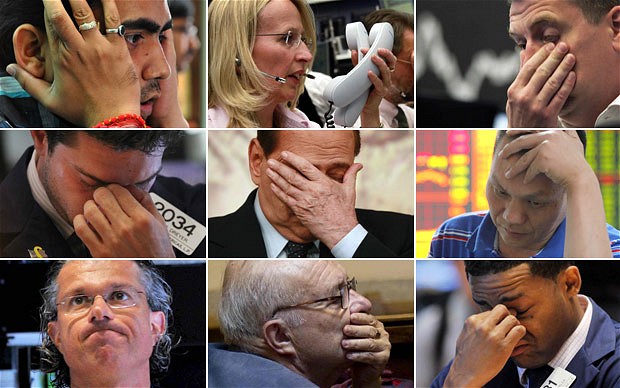Ian Spreadbury, som investerer mere end £4 millarder af penge fra investorer på tværs af en håndfuld af obligationsfonde for Fidelity, deriblandt 'flagskibet' Moneybuilder Income fund, er bekymret om at en "systemisk begivenhed" kunne rokke markederne, muligvis af en størrelse svarende til finanskrisen i 2008, som begyndte i Storbritanien med udtag af penge fra [banken] Northern Rock.
"Der er Systemisk risiko i systemet og som en investor er du nød til at være opmærksom på det," sagde han til Telegraph Money.
Den bedste stategi til at håndtere det, sagde han var for investorer at sprede deres aktiver på tværs af forskellige typer af aktiver, deriblandt guld og sølv, såvel som kontanter i sparekontoer. Men han gik et skridt videre og foreslog at det ville være klogt at holde "fysiske kontanter", et usædvanlig foreslag fra en konventionel fondsbestyrer.
Hans bekymring er at global gæld - og specielt realkreditlån [engelsk: mortgage debt] - er blevet pumpet op i rekordhøjder, hvilket er gjort muligt via specielt lave lånerenter som snart kunne ende, og han er usikker på hvor godt bankerne vil være istand til at håndtere de shock som måtte komme..
Kommentar: Vi undskylder at vi ikke er istand til at oversætte hele artiklen, men er grundet vores lille stab tvunget til fra tid til anden at ty til blot delvis at oversætte artikler, som vi synes også bør komme nordiske læsere til gode.
He pointed out that a saver was covered only up to £85,000 per bank under the Financial Services Compensation Scheme - which is effectively unfunded - and that the Government has said it will not rescue banks in future, hence his suggestion that some money should be held in physical cash.
He declined to predict the exact trigger but said it was more likely to happen in the next five years rather than 10. The current woes of Greece, which may crash out of the euro, already has many market watchers concerned.
Mr. Spreadbury's views are timely, aside from Greece. A growing number of professional investors and commentators are expressing unease about what happens next.
The prices of nearly all assets - property, shares, bonds - have been rising for years.
House prices have risen by 26pc since the start of 2009, and by 68pc in London. The FTSE 100 is up by 75pc.
Although it feels counter-intuitive, this trend of rising prices should continue if economies remain weak, because it gives central banks license to keep rates low and to carry on with their "quantitative easing" programs.
Conversely, if the economy does pick up and interest rates need to rise, the act of doing so is likely to stall the economy and force them to be reduced again. Once more, demand for those mainstream assets would be rekindled and the asset boom continues.
But then there is the shock event. Daily Telegraph columnist Jeremy Warner also captured some of the concerns this week when he wrote that the trigger for an "inevitable correction" could come from "a clear blue sky - a completely unanticipated event".
How are fund managers preparing for this gloomy possibility?
Mr. Spreadbury sticks to bonds because of the remit of his funds. Within that world, he said a shock to the system would cause a flight to safety and the price of British government bonds, or gilts, would rise sharply. He also holds bonds of companies that would be most protected in times of turmoil - water companies, power network operators - and those where the bonds are secured on a solid asset, such as land or buildings.
Examples include Center Parcs and Intu, which owns shopping centers.
Marcus Brookes, another well regarded fund manager who looks after billions of pounds worth of investments, is less constrained in where he invests, because of the different remit of his funds. Schroder Multi-Manager Diversity, for example, can pick and choose between assets.
Mr Brookes said the probability of a major shock event was small but even he holds 29pc of the Diversity portfolio in cash, a huge proportion compared with most funds. This decision is due to his concern that bonds are overvalued and may fall. He aims to deliver returns of 4pc above inflation so can't afford to put too much in assets that he believes will lose money.
"The problem is that people are struggling to work out how to diversify if QE programs stop," he said.
Mr. Spreadbury added: "We have rock-bottom rates and QE is still going on - this is all experimental policy and means we are in uncharted territory.
"The message is diversification. Think about holding other assets. That could mean precious metals, it could mean physical currencies."




Kommentar: Endnu engang et eksempel på at røsterne bliver mere og mere højlydte om et forestående financielt kollaps.